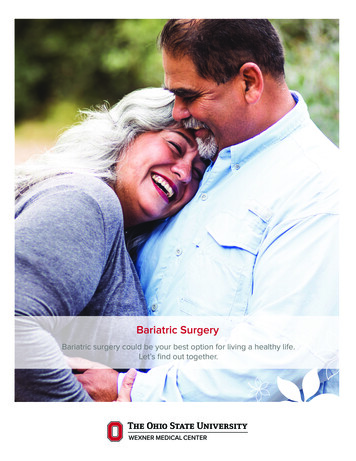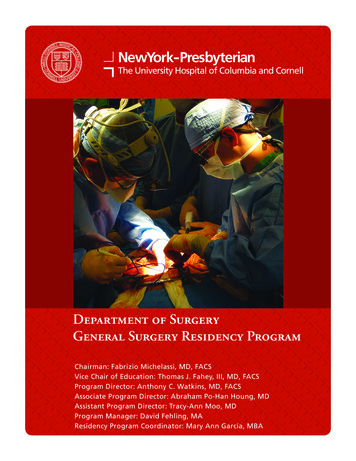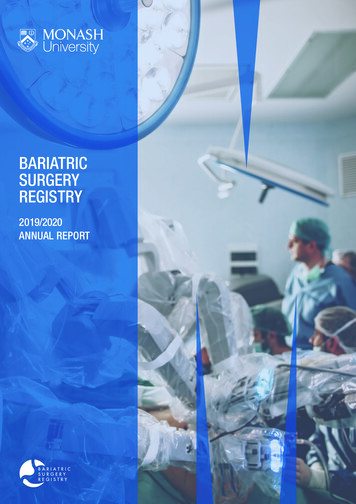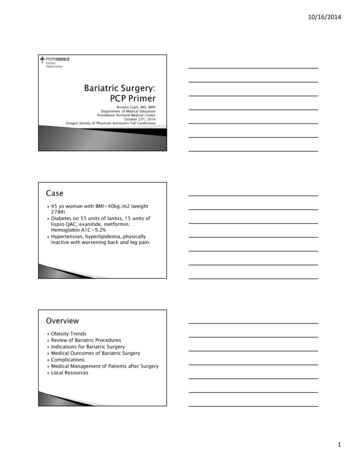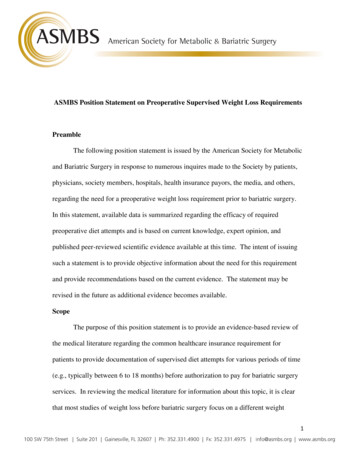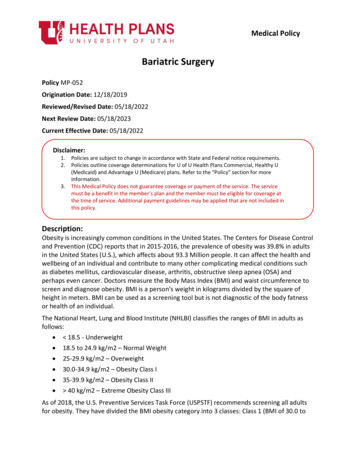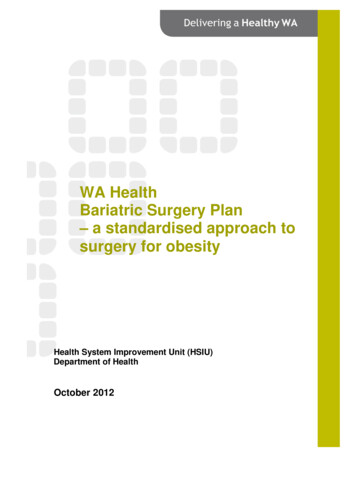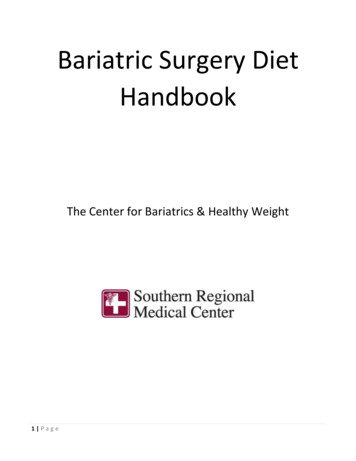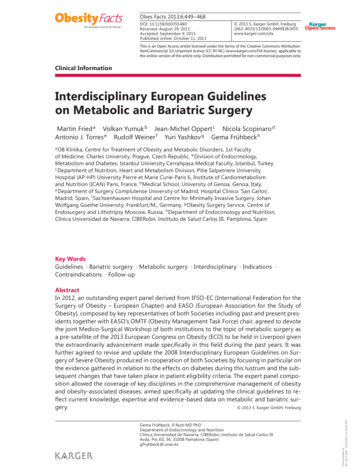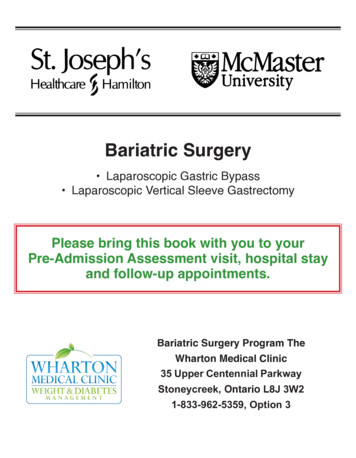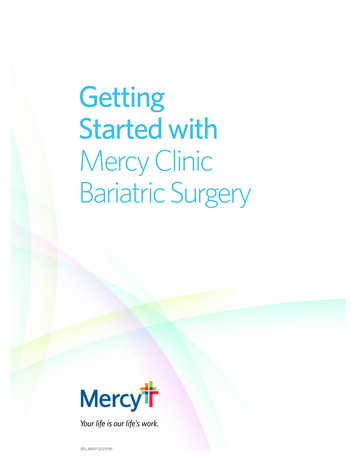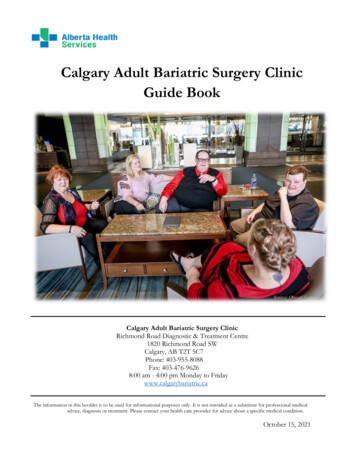
Transcription
Calgary Adult Bariatric Surgery ClinicGuide BookSource: Obesity CanadaCalgary Adult Bariatric Surgery ClinicRichmond Road Diagnostic & Treatment Centre1820 Richmond Road SWCalgary, AB T2T 5C7Phone: 403-955-8088Fax: 403-476-96268:00 am - 4:00 pm Monday to Fridaywww.calgarybariatric.caThe information in this booklet is to be used for informational purposes only. It is not intended as a substitute for professional medicaladvice, diagnosis or treatment. Please contact your health care provider for advice about a specific medical condition.October 15, 2021
The Calgary Adult Bariatric Surgery ClinicWelcome to the Calgary Adult Bariatric Surgery Clinic (CABSC). This booklet will guide you throughthe CABSC program. Read it carefully and bring it to all classes and appointments.BariatricsBariatrics is a branch of healthcare that specializes in the causes, prevention, and treatment of obesity.Mission StatementCABSC is an Alberta Health Services referral program that addresses obesity through bariatric surgery,education and interdisciplinary support to help reduce chronic disease and improve overall quality of life.Self-ManagementBariatric surgery is one of the tools that can help you on your personal health journey. The bariatric teamis here to provide education and guidance; you are responsible for managing your own health.PregnancyIf a patient of the Calgary Adult Bariatric Surgery Clinic becomes pregnant, the patient will bedischarged.Attendance ProtocolMissed appointments and classes impact wait times for other patients. Call our clinic (403-955-8088)To reschedule if you cannot attend due to illness or unforeseen circumstances.o If you miss two (2) appointments or classes, either in-person, telephone, or online, you will bedischarged from the program.o An appointment or class cancelled with less than 48 hours’ notice will be considered a missedappointment.o If you are late or unprepared for your appointment you may be required to reschedule.o You are required to attend appointments every 2-3 months once you have completed yourassessment with a Registered Nurse.The length and order of appointments may vary. Appointment dates and times may change due tounforeseen circumstances. We will provide you with as much notice as possible when this occurs. Weappreciate your understanding if we need to reschedule your appointment.If you have not had contact with the program for six (6) months, you will be discharged. If you areunableto participate in and meet the CABSC program requirements, you will be discharged and can bere- referred at a later date.There is no guarantee you will be a candidate for bariatric surgery. Assessing safety for surgeryand your understanding of how the surgery will affect your life is our primary concern.Assessment is ongoing, and surgical candidacy can change at any time.1
About Bariatric SurgeryMany organizations, including the Canadian Medical Association and the World Health Organization,classify obesity as a chronic disease. The goal of bariatric surgery is to help you manage obesity, manageother chronic diseases such as diabetes or hypertension, achieve better health, and improve your overallquality of life. Bariatric surgery is not a vanity surgery.Average weight loss following surgery is typically 20-30% of your starting weight. It is normal to gain backa small percentage of this weight over time. Some people are content with this progress and enjoy the healthbenefits that come with weight loss. Unfortunately, some people are not satisfied with their weight loss andexpect to reach and sustain unrealistic weight loss goals. Managing expectations about bariatric surgery is anecessary part of surgery success. We encourage you to accept your "best weight". "Best weight" is thelowest weight you can achieve while at the same time maintaining the healthiest lifestyle you can enjoy.Establishing and maintaining a healthy lifestyle for life is the key to long term surgery success. The bariatricteam will help you do this. The fundamentals of a healthy lifestyle include: Healthy eating habits, Engaging in regular physical activity, and Maintaining good mental health.The CABSC offers two surgeries: Laparoscopic Vertical Sleeve Gastrectomy (sleeve) and theLaparoscopic Gastric Bypass Roux-en-Y (bypass). It is important to educate yourself about both surgeriesto understandthe pros and cons of this major operation and life-changing event.For more information about bariatric surgery, visit: CABSC website www.calgarybariatric.ca. Obesity Canada website and read the information at the managing obesity linkhttps://obesitycanada.ca/managing-obesity/ The American Society for Metabolic and Bariatric Surgery (ASMBS) website and read theinformation at the Patient Learning Centre https://asmbs.org/patients2
Laparoscopic Sleeve Gastrectomy (Sleeve)A Vertical Sleeve Gastrectomy is often simply referred to as a “sleeve”. During a VerticalSleeve Gastrectomy a large portion of the stomach is permanently removed. This surgeryreduces the stomach to a pouch the size of a small banana. There are no changes to theintestine, only to the stomach, so the body will continue to absorb most of the calories andnutrients from food and fluids.Advantages of the sleeve gastrectomy The sleeve helps to restrict the amount of food you can eat at one time. It causes achange in gut hormones, which suppresses hunger, promotes satiety, and reduces theway obesity triggers diabetes.Disadvantages of the sleeve gastrectomy The disadvantages of sleeve surgery are that it is irreversible, and there is an increasedrisk of heartburn and reflux. There is a risk of long term nutrient deficiencies; however, it is lower than bypass surgery.3
Laparoscopic Roux-en-Y Gastric Bypass (Bypass)A Laparoscopic Roux-en-Y Gastric Bypass is often simply referred to as a “bypass”. During aLaparoscopic Roux-en-Y Gastric Bypass, the stomach is reduced to a small pouch, the size of anegg. The small pouch is created by stapling off a section of the stomach. The larger portion of thestomach is not removed. The upper part of the small intestine, (the duodenum) is then surgicallyseparated from the middle of the small intestine (the jejunum).The surgeon attaches the jejunum to the new stomach pouch. The duodenum is reattached furtherdown the small intestine so that digestive and gastric juices from the stomach mix with food.Food will now bypass the larger portion of the stomach and the upper part of the small intestinewhere calories and nutrients are absorbed.Advantages of the bypass surgery Bypass surgery is successful because it restricts the amount of food you can eat at one time.It causes a change in gut hormones, which suppresses hunger, promotes satiety, andreduces the way obesity triggers diabetes. One additional advantage of bypass surgery is that it changes food and fluid absorption,leading to more significant weight loss. Disadvantages of the bypass surgery Bypass surgery is technically challenging which can result in greater complication rates. Due to the complexity of this procedure, this surgery should be considered irreversible. There is a risk for nutrient deficiencies because food bypasses the upper portion ofthe small intestine. 4
Possible Surgical ComplicationsSurgical complications are not common, but bariatric surgery is not without risk. As with any surgery, there is a risk of infection, blood clots, reaction to the anesthetic, anda rare but real risk of death. Immediate post-operative complications may include bleeding, leaks from the internal suturelines and infection. You will be monitored at the hospital for signs and symptoms of thesecomplications and treated as needed. For example, if you have a bleed or leak, you may needa second drain inserted or a second surgery. Early complications can result in decreased food intake, which may necessitate tube feeds(parentalnutrition). Long-term post-operative complications may include gallstones, nutritional deficiencies,ulcers inthe stomach or small intestine, and strictures (narrowing of the digestive tract). It is essential to discuss any symptoms that you are worried about with your bariatric team,your surgeon, or your family physician.Possible Benefits of Bariatric Surgery Remission of type 2 diabetes Improved cardiovascular health Decrease in medications Less joint pain Relief of obstructive sleep apnea (OSA) Improved quality of sleep Improved fertility Improved quality of life Increased energy and mobility Increased ability to travel Improved longevity 5
The Bariatric TeamWe are a team of specialized professionals committed to assisting you through your bariatric surgeryjourney. We are here to support you before, during and for one year post surgery. Your team willinclude a registered nurse, registered dietitian, registered psychologist, an internal medicine specialist, abariatric surgeon, our clerical staff and your family physician. You may also work with our registeredsocial worker, a registered nurse practitioner, who is also a certified diabetes educator (CDE), and/orresearchers from the Universityof Calgary.My Bariatric TeamRegistered Nurse (RN)Registered Dietitian (RD)Registered Psychologist (RPsych)Internal Medicine (IM) PhysicianBariatric SurgeonRegistered Social Worker (RSW)Nurse Practitioner (NP) CDENameGetting StartedFirst StepsReferral received and you are accepted into the assessment phase of the CABSCprogram.Orientation ClassLearn about the program expectations and bariatric surgery. This class will be scheduled for you by the clerical staff. Ensure that you follow all the ‘Orientation – pre class instructions’ that willbe emailed to you. For the virtual class you will be asked to verbally provide 2 of the following:your full name, birth date, health care number, or address. Please inform thebariatric team member if you have a support person attending this virtual classwith you. Should in-person classes resume, have your Alberta Health Care card andone piece of photo identification ready to present.Date Complete the intake package.Once we have received your completed package the clerical staff will call you toschedule an assessment with a Registered Nurse (RN) who will become your casemanager.While waiting for your assessment with the RN, visit the CABSCwebsite(www.calgarybariatric.ca) and: Sign up for our CABSC monthly newsletter on the homepage. Review the videos under the ‘Patients’ tab and practice the skills and healthcare suggestions outlined in these videos. Review the links and resources listed under the ‘Additional Resources’ tab.6
Bariatric Surgery Essentialsalso online at calgarybariatric.ca under the ‘Patients’ tab1. Have regular meals Eat regularly throughout the day to ensure you are getting the nutrition you need. Thispractice will also help you manage your hunger which may reduce overeating. By eating at regular intervals now, you will be better prepared to adjust to the post-surgicaleating pattern which generally requires eating 3 meals and 1-2 snacks evenly spread over theday. 2. Choose balanced meals Include protein rich foods, vegetables, fruit, and grains at every meal. Including a variety offoods at your meals and snacks can help you meet your nutrition needs. 3. Use the Four Ps (Plan, Purchase, Prepare and Pack) for meal planning Plan what you want to eat ahead of time. Purchase the food needed to make meals and snacks. Prepare meals/snacks in advance to save time and stress. Pack meals/snacks to bring with you to work, school, or when you are on the go. Packingmeals and snacks can help you reduce eating out. 4. Keep a food record Use a food record to track your food and fluid intake. Share your food record with yourdietitian so they can help you meet your nutrition needs. It is important to note that your food record is a tool to provide you with information aboutyour habits, it is not a tool used for judgment. Use your food record to help you makedecisions. 5. Engage in Physical Activity There are many benefits to physical activity including improved strength, sleep,mobility, flexibility, circulation, heart health and mental health. Find ways to add enjoyable physical activity to your day. Physical activity can take place athome, outside, at a pool or a gym. 6. Seek Social Connection and Support Seek support from family, friends, and coworkers. A support person who accompanies you to appointments and classes and/or educatesthemselves about the surgery can help with physical and emotional adjustments post-surgery. 7. Plan for no carbonated beverages Carbonated beverages can cause gas, bloating and discomfort post-surgery. Many carbonated beverages are high in calories and do not provide nutritional value. We askyou also avoid non-caloric carbonated beverages as well. 8. Plan for no non-steroidal anti-inflammatory drugs (NSAIDs) Stop taking anti-inflammatory medications (NSAIDs) like Aspirin , Ibuprofen , Motrin ,Naproxen or Aleve . These drugs can cause ulcers or stomach irritation in anyone but areespecially linked to a kind of ulcer called “marginal ulcer” after gastric bypass. Marginal ulcers7
can bleed or perforate leading to months or years of recovery. Speak with your family physician, medical specialist, or pharmacist about other medicationsyou can take for pain management. 9. No nicotine and cannabis Nicotine use is associated with slower recovery post-surgery and increased risk of stomach ulcers. Patients smoking tobacco/cannabis, chewing tobacco, smoking e-cigarettes, vaping orusing any nicotine products will be discharged from the CABSC. 10. Plan for no alcohol or substance use Alcohol tolerance can change post-surgery because alcohol moves through your digestivesystem differently and may be absorbed into your bloodstream more quickly. Alcohol irritates the lining of the stomach. Alcohol is high in calories and does not provide nutritional value. Substance use is associated with poor health among bariatric patients and is associated withpoor surgical outcomes. Substance use disorder is an increased risk post-surgery. 11. If applicable - Plan to delay pregnancy for two (2) years after surgery. If you are a woman of childbearing age, we strongly advise you to NOT get pregnant for atleast two (2) years after your bariatric surgery. There are several reasons to avoid getting pregnant during this time: o Your body needs time to heal after surgery.o You need to adjust to significant life changes.o It is challenging to eat enough to support a healthy pregnancy.o Many women do not have enough folic acid, vitamin B12, and iron in their bodiespost-surgery to support a healthy pregnancy.o Nutrient deficiencies can cause severe birth defects, and your baby may be born too small. Many women are more fertile post-bariatric surgery. We encourage you to speak to your familyphysician, gynecologist, or reproductive health care provider about effective birth controlmethods post-bariatric surgery. It is important to note that oral contraception ("The Pill") maynot be effective. If you are considering a tubal ligation, this procedure should be done severalmonths before bariatric surgery to ensure you are protected from becoming pregnant. If you become pregnant at any time after bariatric surgery you and your baby will requireclose monitoring and support. You will need to be followed by a High-Risk PregnancyClinic and community dietitian. 8
Assessment PhaseBring, or have available, the following for all appointments: Your Alberta Health Care card and one piece of photo identification (for in-person appointments) This guide book Your medication, vitamin, mineral and natural health supplement bottles or a list of these, includingdose(s), time of dose(s) and brand names. An up-to-date food record. Any questions you would like to discuss. Registered Nurse (RN) AssessmentDate & TimeYou will meet with a Registered Nurse (RN) who will be your case manager and help younavigate the CABSC program. The RN will review your health history, lifestyle changes,and knowledge of bariatric surgery. Together, you and the RN will create a list of goalsthat may be checked and added to by each bariatric team member. It will be yourresponsibility to work towards these goals while you are waiting for your next clinicappointment. A blood work requisition will be given to you to complete before yourappointment with a dietitian.For this appointment: Bring a list of your medical conditions and specialists. Be prepared to discuss your progress on the Bariatric Surgery Essentials, otherlifestyle changes you have made and goals that you wish to work towards. Be prepared to answer these questions:o Is bariatric surgery right for me?o Is this the right time in my life for bariatric surgery?Nutrition Basics Class with Registered Dietitian (RD)Date & TimeIn this class you will learn about eating habits that are recommended specifically forpeople considering bariatric surgery. You are welcome to have a support person attendthis class with you.Registered Dietitian (RD) AssessmentDate & TimeThe Registered Dietitian (RD) will review your eating habits and blood work results andprovide education on eating well before and after surgery. You and the RD will reviewyour list of goals and add to them as needed.For this appointment: Complete your blood work at least one (1) week before this appointment. Ensure you have a copy of your food record available for the dietitian. This canbe e-mailed to your dietitian in advance or they can access your online foodrecord from their computer.9
Registered Psychologist (RPsych) AssessmentDate & TimePrior to being considered for surgery, a psychologist will assess lifestyle and behavioralfactors related to positive post-surgical outcomes.For this appointment: Be prepared to discuss your progress on the goals agreed upon with your bariatricteam.Other Assessments as NeededDate &TimeInternal Medicine (IM) Physician AssessmentThe IM physician will review your health history, your medical concerns, and yourmedications and will assess your safety for bariatric surgery. You may be asked tocomplete additional testing.An Internal Medicine (IM) physician is NOT a bariatric surgeon.For this appointment: Bring a list of your medical conditions and specialists.Registered Social Worker (RSW) AssessmentThe social worker can provide information and education, referrals to communityagencies and services, and speak with government agencies and other healthcareproviders on your behalf. Prior to being considered for surgery, the social worker mayalso assess lifestyle and behavioral factors related to positive post-surgical outcomes.For this appointment: If applicable, bring your Alberta Works or AISH health benefits card. If applicable, bring the contact name, phone number and office location of yourAlberta Works or AISH worker.Nurse Practitioner (NP) AssessmentThe nurse practitioner specializes in diabetes management.For this appointment: Bring a list of your medical conditions and specialists. If applicable, bring your glucose meter and blood sugar log book. If applicable, bring your blood pressure monitor and record of blood pressure.10
Follow-up AppointmentsDate & TimeYou will follow-up with a bariatric team member at least every 2-3 months. Not everyperson will have the same number or type of appointments. It is your responsibility toensure that you have follow-up appointments booked.It can take many follow-up appointments over a long period time to assess readiness andsafety for bariatric surgery. Failure to attend appointments (whether they are in-person,phone, or by virtual appointment will result in discharge from the CABSC).Follow-up Appointment with:Follow-up Appointment with:Follow-up Appointment with:Follow-up Appointment with:Follow-up Appointment with:Follow-up Appointment with:11
Surgery AssessmentDate & TimeYou will be scheduled for a surgeon assessment by the RN once the team feels you areprepared and safe for surgery. Timeframes to see a surgeon vary. It could take severalmonths before an assessment is scheduled. The surgeon will discuss which bariatricsurgery is best for you, assess your surgical safety, and determine if any diagnostic testingis required (see below).At this appointment, clerical staff will book the Preparing for Surgery class and a followup with a team member.Possible Diagnostic TestingEndoscopyEndoscopy allows your surgeon to view your esophagus, stomach, and upper portionof your small intestine using an endoscope, a small tube with a camera attached. Youwill receive sedation during this procedure therefore you will need someone to driveyou to and from this test.All patients who have has a sleeve gastrectomy are required to have an endoscopy at3, 5 and 10 years post-surgery.The CABSC will refer you to a physician to complete the endoscopy. The physician’soffice will call you directly with your appointment date, location, and instructions onhow to prepare for your endoscopy. Hospitals in Calgary and High River performthis procedure.You will need to call and confirm your appointment time one to three days beforeyour endoscopy. The physician’s office will provide you with a date and phonenumber to call to do this.Date you need to call to confirm appointment:Phone number to call:For further information about this tments/pages/conditions.aspx?Hwid hw267678Upper Gastrointestinal (GI) Series (Barium Swallow)An upper GI study allows the physician to view the inside of your mouth, throat,esophagus, stomach, and upper portion of the small intestine. At this appointmentyou will drink liquid barium which has a thick and chalky texture. As you ingest theliquid, a series of x-rays are taken.The clerical staff will arrange for this test through a diagnostic centre.For further information about this tments/pages/conditions.aspx?Hwid hw235227#hw2323012
Esophageal manometryManometry assesses the function of the esophagus. During the procedure, a thin tubeis guided down your throat to measure the esophagus' pressure and muscle strength.Local freezing into your mouth and nose may be provided before the procedure tomake the test more comfortable.Your surgeon's office will book the appointment for you. This test will be scheduledat South Health Campus.For further information about this tments/pages/conditions.aspx?Hwid hw4640Surgeon Follow-upDate & TimeOnce your tests are done, you must call the CABSC clerical staff (403-955-8088) tobook your surgeon follow-up appointment. The surgeon will review test results, and ifsafe for surgery, you will sign consent for surgery.13
Preparation PhaseGetting your Surgery DateYour surgeon’s office will call you with a surgery date and location. The wait time could be several weeks ormonths. Please call the CABSC clerical staff (403-955-8088) once you have your surgery date. Failureto advise us could delay your surgery. It is also essential to inform us if your surgery date changes. The clericalstaff will book your mandatory pre and post-surgery appointments.The surgeons perform bariatric surgery at the Peter Lougheed Centre (PLC) and South Health Campus(SHC). The type of surgery and operating room availability will determine the location of your operation.Surgery date:Type of surgery :Location of surgery:Name of surgeon(s):Phone number of surgeon:Length of liquid diet:Surgery may be canceled or postponed at any time before your surgery or on the day of surgery.Hospital staffing, changes in your physical, mental, or nutritional health or inability to maintainlifestyle changes may result in your operation being canceled or postponed.Staying in ContactIt is your responsibility to stay in contact with your bariatric team every 2-3 months while waiting forsurgery. Staying in contact includes in-person, online, or scheduled phone call appointments with one of thebariatric team members, or attending an optional pre-surgery class (see below).If you are unable to fulfill this commitment, your surgery will be canceled, and you will bedischarged.MedicationsBariatric surgery and weight loss can alter the absorption of prescription and non-prescription medications(including supplements). It is essential to inform your medical team (family doctor, pharmacist, nursepractitioner, or medical specialist) of your upcoming surgery. Your medical team will review medicationsbefore and after surgery.Be aware that: The type or dose of medication that you are taking may need to change after surgery. Take time toreview this with your family doctor, nurse practitioner, or specialist.14
If you are taking medications to manage diabetes, you will require close monitoring pre and postsurgery by your physician, nurse practitioner, or specialist. As you lose weight, your medicationsmay need to be adjusted to avoid low blood sugar (hypoglycemia). If you are taking medication to manage mental health conditions such as depression or anxiety,you will need to speak with your family physician or psychiatrist regarding your prescription. Thedosage may change as you lose weight. Non-steroidal anti-inflammatories (NSAIDs) such as Aspirin , Ibuprofen , Motrin ,Naproxen , or Aleve can increase your risk of developing ulcers, especially after bariatricsurgery. If you are still using these medications, you must discuss it with your medical team asNSAIDs may not be safe. See pg. 7 for additional information. Birth control pills are not well absorbed following bariatric surgery and are not reliable forcontraception. Speak to your family doctor, gynecologist, or reproductive health care providerabout effective birth control. See pg. 8 for additional information.Pre-Surgery Classes and AppointmentsDate & TimePreparing for Surgery ClassLearn about preparing for bariatric surgery, what to expect in the hospital, and what to doonce you are discharged home. You will also learn about post-surgery eatingrecommendations. This class is taught by an RD and RN. You are welcome to have asupport person attend with you.Nurse Practitioner (NP) Appointment (if applicable)Review diabetes management pre and post-surgery. Review the signs and symptoms of a low blood sugar and how to treat. How often to test your blood sugars while on the pre-surgery liquid diet and howoften to test your blood sugars after bariatric surgery. Review suggested medication adjustments and when to call with questions.Pre-Surgery Nutrition (RD) AppointmentDiscuss your pre-surgery liquid diet, blood work and review post-surgery eatingrecommendations. It applicable, complete your blood work one (1) week before this appointment. Bring your handouts and questions from the Preparing for Surgery Class.Pre-Admission ClinicA nurse from the hospital will call you to review your medical history, medications andbook an in-person appointment.Location:Phone number of Pre-Admission Clinic: Bring all of the medications, vitamin, mineral and natural health supplements youtake (in their usual packaging), or a list of these including: doses, time of dose(s)and brand names. Complete pre-op blood work as directed by the Pre-Admission Clinic. This is notthe same blood work requested by your bariatric team.15
At this appointment: You may get a hospital wrist band to wear – do not remove until after surgery. If you use a c-pap or bi-pap you will be given instructions for its use at thehospital You will be instructed when to stop your medications, vitamins and supplements You will be instructed when to have your last meal You will be instructed when to stop fluids You may meet an Anesthesiologist. You may meet an Internal Medicine specialist. You may be required to get further medical testing.Optional Pre-Surgery ClassesDate & TimePre-Surgery Bariatric Cooking ClassCook and taste dishes that represent the post-surgery diet progression. To attend thisclass, you must have signed consent for surgery but not yet had surgery, and you musthave attended the Preparing for Surgery Class.Location: South Health Campus Wellness KitchenTo register: Call 403-956-3939 or https://app.bookking.ca/bkshcwellnesspubYou are welcome to bring a support person who must also register for the class.Improve Your Relationship with FoodLed by a Registered Psychologist, this group provides education and support to help youimprove your relationship with food. This group is for both pre-surgery and post-surgerypatients.Class is offered monthly at varying times.To register: Call 403-955-8088This group is for registered pre and post-surgery CABSC patients only.Managing changes in Body ImageThis group offers a chance to discuss changes in body image. It will also provide ideas onhow to manage a positive body image.To register: Call 403-955-8088This group is for registered pre and post-surgery CABSC patients only.Bariatric Peer Support GroupThis group focuses on support and is facilitated by peer volunteers. The group will discussimportant topics related bariatric surgery.To register go to http://app.bookking.ca/ahlpcalgarypub/index.aspThe class is called CABSC Peer Support Group. Create an account to register.16
Surgery DayPack and bring:Your medications, vitamins, mineral and natural health supplements, or a list of these including doses,time of dose(s), and brand names.If applicable, bring your CPAP or BiPAP machine.Personal items (i.e., toothbrush, toiletries, change of clothes, slippers, reading materials, etc.)Do not bring valuables to the hospital.Once you are at the hospital:Go to the Admitting Department.You will be directed to either the Day or Inpatient Unit. There, your demographics and health historywill be reviewed by a nurse. It is helpful to know the time of your last dose of any medication you aretaking. An IV may be started.You will be
Calgary Adult Bariatric Surgery Clinic Guide Book Calgary Adult Bariatric Surgery Clinic Richmond Road Diagnostic & Treatment Centre 1820 Richmond Road SW Calgary, AB T2T 5C7 Phone: 403-955-8088 Fax: 403-476-9626 8:00 am - 4:00 pm Monday to Friday www.calgarybariatric.ca The information in this booklet is to be used for informational purposes only.
